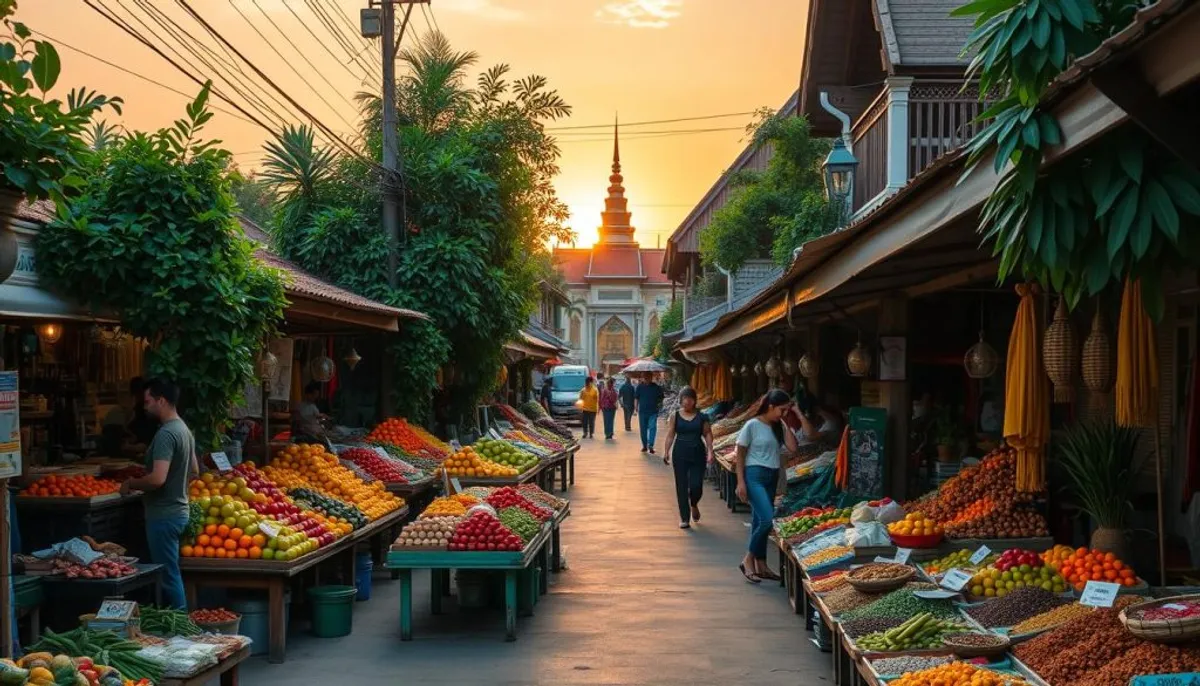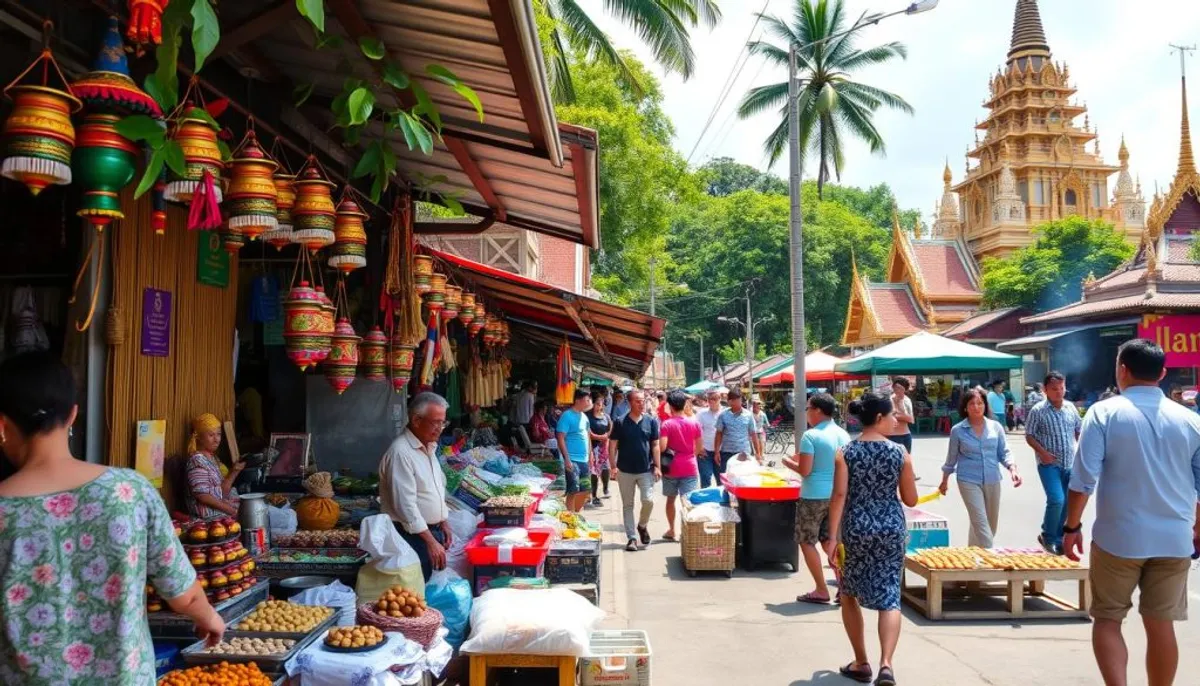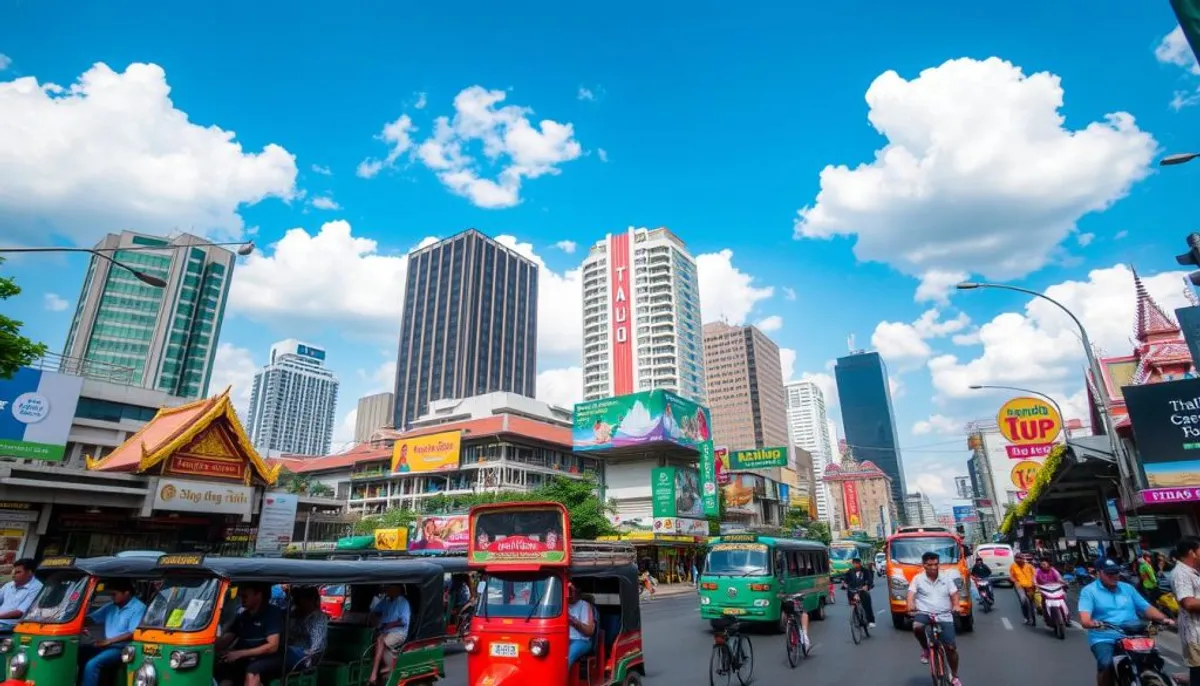Thailand attracts French travelers seeking a deep cultural immersion. Our survey highlights the challenges and joys of this adventure. Travelers' testimonials provide a direct insight into this much-desired journey.

Stays last on average 14 days, with groups of 2 to 5 people. Bangkok, Koh Lanta, and Chiang Mai are must-visit places. Visitors are captivated by the temples, beaches, and local cuisine. Despite language and cultural challenges, 92% of travelers express their satisfaction.
Adapting to the tropical climate and local traditions is a process that takes time. Transportation in Bangkok can be a challenge. However, the kindness of the Thai people and the depth of their culture make these obstacles minor. This experience in Thailand promises a memorable adventure for those who open themselves to diversity.
Our survey on daily life in Thailand
We conducted an in-depth survey of 1,017 people who stayed in Thailand. This survey helped identify the advantages and areas for improvement in the country. It provides a comprehensive overview of travelers' experiences.
Highlights according to travelers
Thailand received an impressive overall rating of 8.2/10. This rating reflects the general satisfaction of visitors. The main strengths mentioned are:
- The diversity of landscapes
- The warm welcome from the Thai people
- The local cuisine
- The affordable cost of living
- The ease of getting around
- The pleasant climate
Areas for improvement
Our survey also revealed some disadvantages of Thailand:
- Mass tourism in certain areas
- A loss of authenticity in highly touristic zones
- Scams targeting tourists
- Pollution in large cities
- Animal exploitation in some attractions
Overall rating and evaluation criteria
Our survey allowed for the evaluation of various aspects of the stay:
| Criterion | Rating out of 10 |
|---|---|
| Safety | 8.5 |
| Culture | 9.2 |
| Accommodations | 8.0 |
| Transportation | 7.8 |
| Cleanliness | 7.5 |
These results provide a balanced overview of daily life in Thailand. They highlight the positive aspects and areas needing improvement.
The challenges of cultural immersion
Integration in Thailand poses major challenges for expatriates. Cultural shock is common, requiring a deep Thai learning to adapt.
The language barrier in daily life
Most Thais communicate in Thai. Outside tourist areas, English is rare. This makes daily life difficult for non-English speakers, especially for administrative or medical procedures. Learning simple phrases like “Sà-wàt-dii” (hello) or “Kòp khun” (thank you) is crucial.

Adapting to local customs
Participating in traditional festivals like Songkran or Loi Krathong is essential for understanding the culture. Learning Thai through apps like Duolingo or courses at the Alliance Française helps grasp cultural nuances. Podcasts and YouTube channels offer resources for improvement.
Relationships with Thais
Building connections with locals takes time and effort. Joining expatriate clubs or participating in cultural events makes it easier to meet people. Learning a few phrases like “Phood thai dai mai?” (Do you speak Thai?) shows your interest in the local culture. With patience, integration in Thailand becomes a rewarding experience.
Opinions on Thai culture and lived experiences
Testimonials about Thailand reveal marked satisfaction among French travelers. They value the diversity of landscapes, cultural depth, and the hospitality of the Thai people. The overall rating of 4.7/5, given since 2008, reflects this positive experience.
Feedback highlights unforgettable moments. Visiting Buddhist temples alongside modern skyscrapers in Bangkok illustrates the fascinating blend of tradition and modernity. Travelers advise not to miss swimming in the Erawan waterfalls, cooking classes in Chiang Mai, and biking in Ayutthaya.
Traveler reviews emphasize the quality of trip organization. They appreciate charming accommodations, punctual private transport, and passionate guides. The average cost of Thai meals, around €10, including drinks, is considered affordable.
| Appreciated aspects | Points to improve |
|---|---|
| Diversity of landscapes | Meal prices on certain islands |
| Cultural richness | Lack of local fruits at breakfast |
| Welcome from Thais | Stricter laws for expatriates |
| Quality of guides | Rising cost of living |
Travelers highlight the ease of access to other Southeast Asian countries from Thailand. They also appreciate religious tolerance, especially for Muslims, with many halal food options available.
Practical life in Thailand
Thailand is a country where the ancient and the modern meet, offering a unique living experience. This fascinating country combines millennia-old traditions with dynamic modernity. Here’s an overview of the practical aspects of daily life in Thailand.
Daily transportation
Transportation in Bangkok is diverse and easily accessible. The metro (MRT) and BTS make getting around the capital simpler. Iconic tuk-tuks are ideal for short trips. Taxis, traditional or via apps, are everywhere. However, frequent traffic jams can complicate travel.

The climate and its implications
The climate in Thailand is tropical, with an average temperature of 33°C year-round. Humidity is very high, and the rainy season is intense. These conditions influence the pace of life and daily activities. It is essential to stay hydrated regularly and protect oneself from the sun.
The cost of living
The budget for a trip to Thailand is generally advantageous, especially in the North of the country. Local food, including Haitian cuisine, and transportation are affordable. However, tourist areas and Bangkok can be more expensive. For long stays, international insurance is recommended to cover potential medical expenses.
| Expense | Average cost (in baht) |
|---|---|
| Street food meal | 50-100 |
| Tuk-tuk ride | 100-200 |
| Night in a hostel | 300-500 |
The authentic aspects of Thai culture
Thailand is a true cultural treasure, offering unmatched richness. Its millennial heritage manifests through its gastronomy, festivities, and spirituality. These elements contribute to the unique appeal of this Southeast Asian country.
Traditional gastronomy
Thai cuisine is famous for its distinct flavors. It masterfully combines sweet, salty, sour, and spicy. Rice, aromatic herbs, lime, and coconut milk are essential ingredients. Local markets and street food allow for a complete immersion in this culinary culture.
Festivals and celebrations
Traditional festivals are essential in Thailand. Songkran, or Buddhist New Year, takes place from April 13 to 15. It is a time of great celebration throughout the country. Thai weddings, with their extended festivities, are also major events.
Spirituality in daily life
Buddhism plays a predominant role in Thailand, with about 95% of the population identifying as Buddhist. This influence is seen in the presence of numerous temples and daily practices. The “wai,” a traditional greeting, is a common gesture of respect. The revered royal family is a pillar of the country's religious culture.
| Religion | Percentage of the population |
|---|---|
| Buddhism | 94% |
| Islam | 5% |
| Christianity | 1% |
| Animism | 0.5% |
Conclusion
A travel review of Thailand reveals an experience rich in cultural and sensory discoveries. The warm welcome of the Thai people and the beauty of the landscapes deeply mark travelers. The gastronomy, with its unique flavors like pad Thai or tom yum, offers a feast for the taste buds. The omnipresent Buddhist temples testify to the importance of spirituality in daily life.
Among the travel tips for Thailand, adapting to the tropical climate and managing transportation are essential. The language barrier can pose some challenges, but it does not hinder immersion in the local culture. Festivals like the Thai New Year in April allow for authentic and joyful moments with locals.
Ultimately, a trip to Thailand promises an unforgettable experience. Whether in Bangkok, on the beaches of Koh Tao, or in the northern mountains, each region reveals a unique aspect of Thai culture. The study of comparative culture also allows for a better understanding of the interactions between different traditions. By remaining open and respectful of local customs, travelers leave with precious memories and a new perspective on this fascinating country.
RelatedRelated articles


